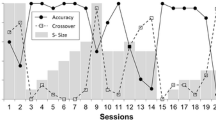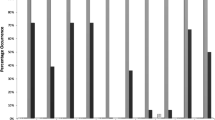Abstract
Thirty-three impulsive learning- disabled males, aged 9–12 years, were assigned to one of three treatment conditions: (a) Modeling, in which subjects were exposed to a videotape of a boy demonstrating reflective problem-solving activities and instructing himself to perform cautiously; (b) Modeling Plus Self-Verbalization, in which subjects observed the same videotape and were additionally required to verbalize similar reflective instructions; and (c) Control, in which subjects were shown a videotape of the task materials used in the modeling videotape, but without the model. Subjects were tested immediately after exposure to treatment, and again 3 weeks later, on different forms of the Matching Familiar Figures test. Both Modeling and Modeling Plus Self-Verbalization conditions were superior to Control in reducing errors on the immediate test, but the three treatments did not differ on the delayed test. No significant differences among the three conditions were found with regard to response latency. Discrepancies between the present results and those of previous related studies were noted, and potential research directions were suggested.
Similar content being viewed by others
References
Campbell, S. B. Cognitive styles in reflective, impulsive, and hyperactive boys and their mothers.Perceptual and Motor Skills, 1973,36, 747–752.
Cathcart, G., & Liedtke, W. Reflectiveness/impulsiveness and mathematics achievement.Arithmetic Teacher, 1969,16, 563–567.
Clements, S. D.Minimal brain dysfunction in children (NINDS Monograph No. 3, U.S. Public Health Service Publication No.1415). Washington, D.C.: U.S. Government Printing Office, 1966.
Debus, R. L. Effects of brief observation of model behavior on conceptual tempo of impulsive children.Developmental Psychology, 1970,2, 22–32.
Douglas, V. I. Stop, look and listen: The problem of sustained attention and impulse control in hyperactive and normal children.Canadian Journal of Behavioral Science, 1972,4, 259–282.
Egeland, B. Training impulsive children in the use of more efficient scanning techniques.Child Development, 1974,45, 165–171.
Epstein, M. H., Cullinan, D., & Sternberg, L. Impulsive cognitive tempo in severe and mild learning disabled children.Psychology in the Schools, 1977,14, 290–294.
Epstein, M. H., Hallahan, D. P., & Kauffman, J. M. Implications of the reflectivity-impulsivity dimension for special education.Journal of Special Education, 1975,9, 11–25.
Errickson, E. A., Wyne, M. D., & Routh, D. K. A response-cost procedure for reduction of impulsive behavior of academically handicapped children.Journal of Abnormal Child Psychology, 1973,7, 350–357.
Finch, A. J., Wilkinson, M. D., Nelson, W. M., & Montgomery, L. E. Modification of an impulsive cognitive tempo in emotionally disturbed boys.Journal of Abnormal Child Psychology, 1975,5, 49–52.
Hallahan, D. P., & Kauffman, J. M.Introduction to learning disabilities. Englewood Cliffs, New Jersey: Prentice-Hall, 1976.
Hallahan, D. P., Kauffman J. M., & Ball, D. W. Selective attention and cognitive tempo of low achieving and high achieving sixth grades males.Perceptual and Motor Skills, 1973,36, 579–583.
Helder, E. R. Information processing and the modification of an “impulsive conceptual tempo”. Child Development, 1971,42, 1276–1281.
Hemry, F. P. Effect of reinforcement conditions on a discrimination learning task for impulsive versus reflective children.Child Development, 1973,44, 657–660.
Kagan, J. Reflection-impulsivity and reading ability in primary grade children.Child Development, 1965,36, 609–628.
Kagan, J. Reflection-impulsivity: The generality and dynamics of conceptual tempo.Journal of Abnormal Psychology, 1966,71(1), 17–24.
Kagan, J., Pearson, L., & Welch, L. Modifiability of an impulsive tempo.Journal of Educational Psychology, 1966,57, 359–365.
Keogh, B. K., & Donlon, G. Field dependence, impulsivity, and learning disabilities.Journal of Learning Disabilities, 1972,5, 331–336.
Keogh, B. K., & Margolis, J. Learn to labor and wait: Attentional problems of children with learning disorders.Journal of Learning Disabilities, 1976,9, 276–286.
Kirk, R. K.Experimental design: Procedures for the behavioral sciences. Belmont, California: Brooks/Cole, 1968.
Meichenbaum, D. H., & Goodman, J. Training impulsive children to talk to themselves: A means of developing self control.Journal of Abnormal Psychology, 1971,77, 115–126.
Myers, J. L.Fundamentals of experimental design. Boston: Allyn & Bacon, 1966.
Odom, R. D., McIntyre, C. W., & Neale, G. S. The influence of cognitive style on perceptual learning.Child Development, 1971,42, 883–891.
Ollendick, T. H., & Finch, A. J. Relfection-impulsivity in brain-damaged and normal children.Perceptual and Motor Skills, 1973,36, 654.
Palkes, H., Stewart, W., & Kahana, B. Porteus maze performance of hyperactive boys after training in self-directed verbal commands.Child Development, 1968,39, 817–826.
Ridbeig, E. H., Parke, R. D., & Hetherington, E. M. Modification of impulsive and reflective cognitive styles through observation of film-mediated models.Developmental Psychology, 1971,5, 369–377.
Strang, H. R. Changing disadvantaged children's learning tempo through automated techniques.Journal of Genetic Psychology, 1974,124, 91–98.
Author information
Authors and Affiliations
Additional information
The authors appreciate the cooperation and support of Mr. Dan Hurd, superintendent of DeKalb County Special Education Association.
Rights and permissions
About this article
Cite this article
Cullinan, D., Epstein, M.H. & Silver, L. Modification of impulsive tempo in learning-disabled pupils. J Abnorm Child Psychol 5, 437–444 (1977). https://doi.org/10.1007/BF00915091
Revised:
Issue Date:
DOI: https://doi.org/10.1007/BF00915091




